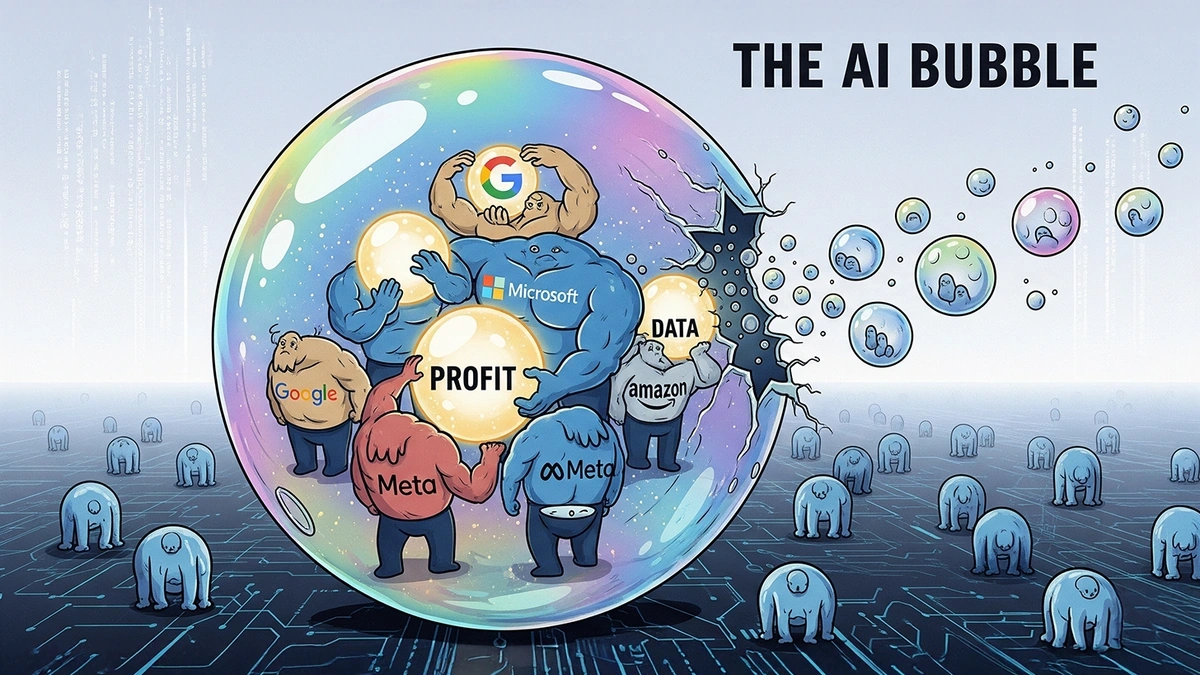We’ve all seen the headlines: AI is going to revolutionize everything! From farming to finance, no industry is safe. But here’s the thing: sitting here in India, sipping my masala chai, I can’t help but wonder… is this AI revolution real, or are we caught in an AI bubble, inflated by hype and unrealistic expectations? Let’s be honest, the tech world loves a good bubble. And sometimes, these bubbles burst, leaving a trail of disappointment and wasted potential. I initially thought this was just typical tech exuberance, but then I realized the implications could be far-reaching, especially for a country like India that’s pinning so many hopes on AI for its future.
The “Why” Behind the Hype: Decoding the AI Narrative
So, why all the fuss about AI right now? It’s not just one thing, it’s a confluence of factors. The advancements in machine learning algorithms , especially deep learning, have been truly remarkable. Suddenly, machines can do things that were previously thought to be the exclusive domain of humans – like recognizing faces, translating languages, and even generating creative content. But – and this is a big but – these advancements are often presented in a way that glosses over the limitations. For example, the models are very data hungry and expensive to train and maintain. According to a recent report by McKinsey, while AI can create significant value, realizing that value requires a very nuanced understanding of where it can be applied effectively.
Another key driver is the sheer amount of investment pouring into AI. Venture capitalists are throwing money at AI startups, hoping to find the next big thing. This creates a feedback loop: more investment leads to more hype, which in turn attracts even more investment. The problem is that not all of these AI companies are actually solving real problems or creating sustainable businesses. Some are simply riding the wave, hoping to get acquired before the music stops. This overfunding is very similar to dotcom bubble, but only time can tell if AI will have the same fate.
The India Angle: Opportunities and Risks
India has a unique stake in the AI story. We have a massive pool of talent, a growing economy, and a desperate need for solutions to pressing problems like healthcare, education, and agriculture. AI could be a game-changer for India, helping us leapfrog traditional development models and create a more prosperous future. The Indian government has been actively promoting AI research and adoption, with initiatives like the National AI Strategy. What fascinates me is, how effectively these policies will be adopted. However, there are also significant risks. If the AI bubble bursts, it could lead to job losses, wasted investments, and a loss of faith in technology’s ability to solve our problems. Think about the potential impact on the IT sector, which is a major employer in India. If AI-powered automation takes over many of the tasks currently performed by IT professionals, what will happen to them?
Navigating the AI Hype: A Practical Guide for Indians
So, how do we navigate this artificial intelligence hype cycle? How do we separate the signal from the noise? Here are a few practical tips:
1. Be skeptical: Don’t believe everything you read in the headlines. Always question the claims being made about AI. Look for evidence and data to back up the claims. Consider the source of the information. Is it a reputable news organization, or a company with a vested interest in promoting AI?
2. Focus on real-world applications: Instead of getting caught up in the theoretical possibilities of AI, focus on the concrete ways it can be used to solve real-world problems. Look for examples of AI being used successfully in India. For example, the use of AI in precision agriculture to help farmers improve crop yields.
3. Invest in education and training: The best way to prepare for the future of AI is to invest in education and training. Learn about AI technologies, develop your skills, and stay up-to-date on the latest developments. There are many online courses and resources available, including free courses offered by Google and Microsoft.
4. Advocate for responsible AI development: We need to ensure that AI is developed and used in a way that is ethical, transparent, and accountable. This requires a multi-stakeholder approach, involving governments, businesses, researchers, and civil society organizations. We need to address issues like bias in AI algorithms, data privacy, and the potential for AI to be used for malicious purposes.
And, always keep learning and adapting. The field of AI is evolving rapidly, so it’s important to stay informed and be willing to adjust your thinking as new developments emerge. Remember that the AI revolution is a journey, not a destination. It’s a process of continuous learning, experimentation, and adaptation. Let’s work towards a future where AI benefits all of humanity, not just a privileged few.
The Role of Government and Regulation
Let me rephrase that for clarity… Governments have a crucial role to play in ensuring that AI is developed and used responsibly. This includes setting standards for AI safety , protecting data privacy, and preventing the misuse of AI. India needs to develop a comprehensive regulatory framework for AI, one that promotes innovation while also safeguarding the public interest. This framework should address issues like algorithmic bias, data security, and the ethical implications of AI. It should also promote transparency and accountability in the development and deployment of AI systems. This is easier said than done, of course. Striking the right balance between fostering innovation and mitigating risks is a complex challenge. But it’s a challenge we must address if we want to harness the full potential of AI while avoiding the pitfalls.
The Human Element: AI and the Future of Work
Here’s the thing… we cannot forget the human element. AI is not just about technology; it’s about people. It’s about how we live, work, and interact with each other. As AI becomes more prevalent, it will inevitably transform the nature of work. Some jobs will be automated, while new jobs will be created. The key is to prepare for this transition by investing in education, training, and social safety nets. We need to ensure that workers have the skills and resources they need to adapt to the changing labor market. We also need to consider the ethical implications of AI-powered automation. How do we ensure that the benefits of AI are shared equitably? How do we prevent AI from exacerbating existing inequalities? These are complex questions that require careful consideration and open dialogue.
In conclusion, while the potential of AI is undeniable, it’s crucial to approach it with a healthy dose of skepticism and a clear understanding of the risks involved. We need to move beyond the hype and focus on real-world applications that can benefit society as a whole. India has a unique opportunity to be a leader in the responsible development and deployment of AI. But to seize this opportunity, we need to be smart, strategic, and above all, human. According to a report by NASSCOM NASSCOM , India has the potential to become a global hub for AI innovation, but realizing this potential requires a concerted effort from government, industry, and academia. And we must never forget that AI is a tool, and like any tool, it can be used for good or for ill. It’s up to us to ensure that it is used for the benefit of all.
FAQ
What exactly is an “AI Bubble”?
It’s like the dot-com bubble, but with AI. Over-inflated expectations lead to over-investment, which eventually pops when reality doesn’t match the hype.
Is AI really going to take my job?
Maybe, maybe not. Some tasks will be automated, but new jobs will also emerge. Focus on skills that are hard to automate: critical thinking, creativity, and emotional intelligence.
How can I learn more about AI without getting overwhelmed?
Start with the basics. There are tons of free online courses. Focus on understanding the core concepts and then explore specific applications that interest you.
What are the biggest ethical concerns with AI in India?
Bias in algorithms, data privacy, and the potential for job displacement are major concerns. We need to ensure that AI is developed and used in a way that is fair and equitable.
What if I am not good at technology?
You don’t need to be a tech expert to understand the implications of AI. Focus on developing your critical thinking skills and asking tough questions about the impact of AI on society.
Where can I find reliable information about AI in India?
Look for reports and publications from reputable organizations like NASSCOM, McKinsey, and the Indian government’s Ministry of Electronics and Information Technology (MeitY).





